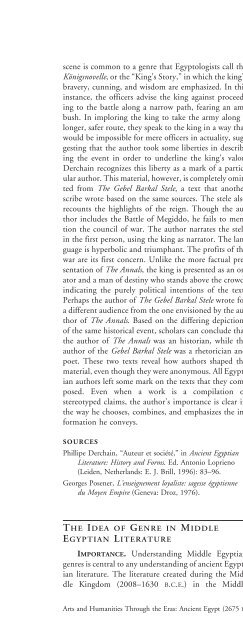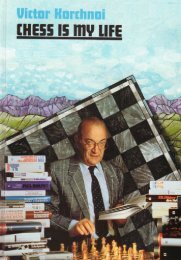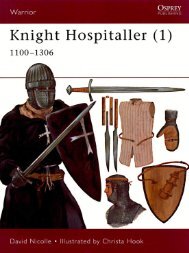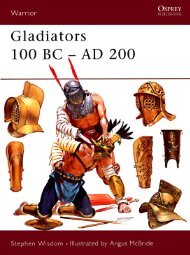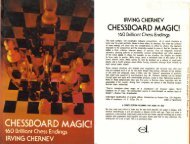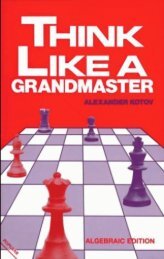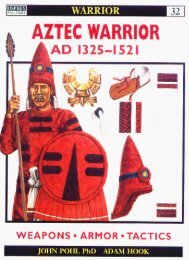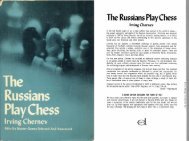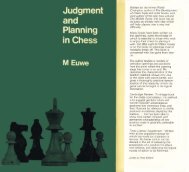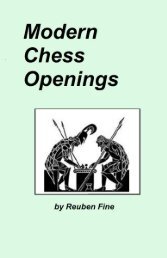Through the Eras
Edward Bleiberg ed., Ancient Egypt (2675-332 ... - The Fellowship
Edward Bleiberg ed., Ancient Egypt (2675-332 ... - The Fellowship
You also want an ePaper? Increase the reach of your titles
YUMPU automatically turns print PDFs into web optimized ePapers that Google loves.
Literaturescene is common to a genre that Egyptologists call <strong>the</strong>Königsnovelle, or <strong>the</strong> “King’s Story,” in which <strong>the</strong> king’sbravery, cunning, and wisdom are emphasized. In thisinstance, <strong>the</strong> officers advise <strong>the</strong> king against proceedingto <strong>the</strong> battle along a narrow path, fearing an ambush.In imploring <strong>the</strong> king to take <strong>the</strong> army along alonger, safer route, <strong>the</strong>y speak to <strong>the</strong> king in a way thatwould be impossible for mere officers in actuality, suggestingthat <strong>the</strong> author took some liberties in describing<strong>the</strong> event in order to underline <strong>the</strong> king’s valor.Derchain recognizes this liberty as a mark of a particularauthor. This material, however, is completely omittedfrom The Gebel Barkal Stele, a text that ano<strong>the</strong>rscribe wrote based on <strong>the</strong> same sources. The stele alsorecounts <strong>the</strong> highlights of <strong>the</strong> reign. Though <strong>the</strong> authorincludes <strong>the</strong> Battle of Megiddo, he fails to mention<strong>the</strong> council of war. The author narrates <strong>the</strong> stelein <strong>the</strong> first person, using <strong>the</strong> king as narrator. The languageis hyperbolic and triumphant. The profits of <strong>the</strong>war are its first concern. Unlike <strong>the</strong> more factual presentationof The Annals, <strong>the</strong> king is presented as an oratorand a man of destiny who stands above <strong>the</strong> crowd,indicating <strong>the</strong> purely political intentions of <strong>the</strong> text.Perhaps <strong>the</strong> author of The Gebel Barkal Stele wrote fora different audience from <strong>the</strong> one envisioned by <strong>the</strong> authorof The Annals. Based on <strong>the</strong> differing depictionsof <strong>the</strong> same historical event, scholars can conclude that<strong>the</strong> author of The Annals was an historian, while <strong>the</strong>author of <strong>the</strong> Gebel Barkal Stele was a rhetorician andpoet. These two texts reveal how authors shaped <strong>the</strong>material, even though <strong>the</strong>y were anonymous. All Egyptianauthors left some mark on <strong>the</strong> texts that <strong>the</strong>y composed.Even when a work is a compilation ofstereotyped claims, <strong>the</strong> author’s importance is clear in<strong>the</strong> way he chooses, combines, and emphasizes <strong>the</strong> informationhe conveys.SOURCESPhillipe Derchain, “Auteur et société,” in Ancient EgyptianLiterature: History and Forms. Ed. Antonio Loprieno(Leiden, Ne<strong>the</strong>rlands: E. J. Brill, 1996): 83–96.Georges Posener, L’enseignement loyaliste: sagesse égyptiennedu Moyen Empire (Geneva: Droz, 1976).THE IDEA OF GENRE IN MIDDLEEGYPTIAN LITERATUREIMPORTANCE. Understanding Middle Egyptiangenres is central to any understanding of ancient Egyptianliterature. The literature created during <strong>the</strong> MiddleKingdom (2008–1630 B.C.E.) in <strong>the</strong> MiddleEgyptian dialect, <strong>the</strong> spoken language of this period,was <strong>the</strong> classical literature of ancient Egypt. Egyptianscontinued to read, study, and enjoy it through <strong>the</strong> NewKingdom into <strong>the</strong> Late Period—essentially <strong>the</strong> full extentof subsequent ancient Egyptian history. In moderntimes, a genre refers to a type of literature. Eachgenre has a formal pattern known to readers and authorsand is related to <strong>the</strong> culture surrounding it.Egyptian authors and readers had no idea of modernliterary genres like <strong>the</strong> novel, epic, tragedy, or comedy.These European literary genres derive from <strong>the</strong>ories developedby <strong>the</strong> Greek philosopher Aristotle (384–322B.C.E.) who lived 1,500 years after authors composedin Middle Egyptian. The Egyptians did have <strong>the</strong>ir owncategories of literature, however. It is important to rememberthat such systems of classification belong to aparticular culture. There are no universal classificationsystems in literature, but <strong>the</strong> idea of genre does existacross cultures. Knowledge of genre is important becauseit influences judgments of quality. When modernreaders try to appreciate ancient Egyptian literature,a particular work seems deficient because <strong>the</strong> rules andexpectations held by <strong>the</strong> original readers and authorsare not clear. For example, The Shipwrecked Sailor hasbeen compared to a modern short story. Yet it lacks<strong>the</strong> clear motivations and characterizations that a modernreader might expect in this modern genre. Modernreaders, thus, judge by rules unknown to <strong>the</strong> originalreaders and authors. It is thus important to define ancientEgyptian genres that <strong>the</strong> original readers from <strong>the</strong>culture would have recognized intuitively. If modernreaders are to understand an ancient literature <strong>the</strong>ymust understand <strong>the</strong> expectations <strong>the</strong> original readershad when <strong>the</strong>y read. Indeed, <strong>the</strong> author shaped narrativeswhile writing to conform to <strong>the</strong> original reader’sexpectations.DISCOVERING ANCIENT GENRES. Egyptologistshave recognized certain patterns in Egyptian literaryworks and <strong>the</strong>n grouped works by type to establish ancientgenres. These patterns sometimes can be recognizedin <strong>the</strong> contents. For example, Egyptologists grouptoge<strong>the</strong>r narratives that tell a story, teachings that giveadvice, or poetry that describes emotions. They alsogroup works by linguistic forms. These forms includeformulae—exact wordings repeated from work towork—or patterns—such as <strong>the</strong> thought couplet where<strong>the</strong> same thought is expressed twice in different words.Ano<strong>the</strong>r criterion for distinguishing genres is <strong>the</strong> socialsetting. Some works describe only royalty or commonersor priests. Scholars consider all of <strong>the</strong>se factors whenidentifying genres.Arts and Humanities <strong>Through</strong> <strong>the</strong> <strong>Eras</strong>: Ancient Egypt (2675 B.C.E.–332 B.C.E.) 123


